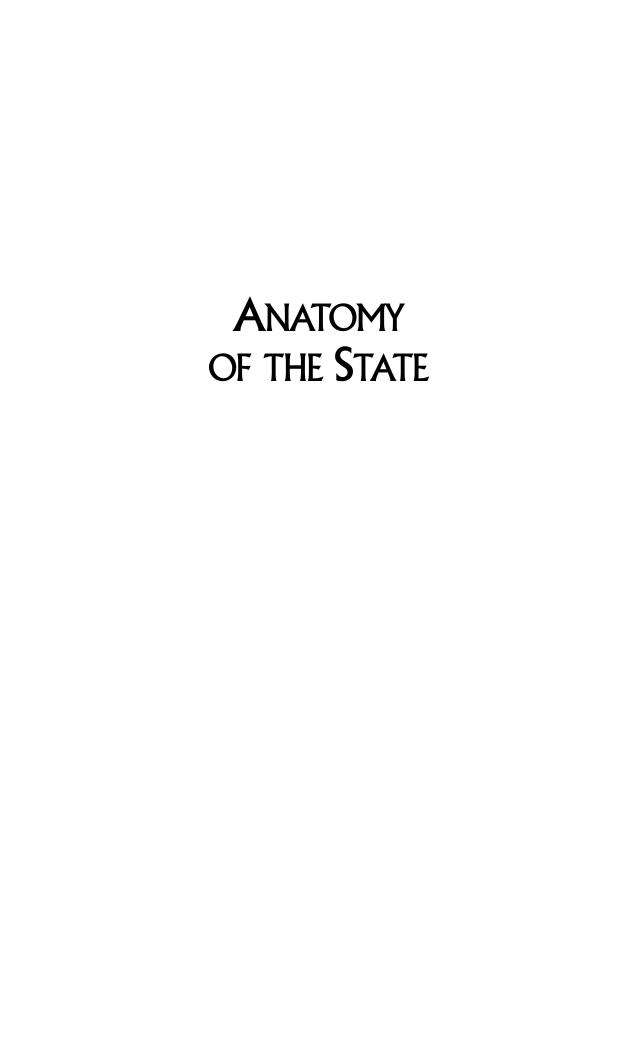Anatomy of the State by Murray N. Rothbard

Author:Murray N. Rothbard [Murray N. Rothbard]
Language: eng
Format: epub, mobi, pdf
ISBN: 978-1-93355-048-0
Publisher: Ludwig von Mises Institute
Published: 2009-03-25T16:00:00+00:00
__________________
20 De Jouvenel, On Power, pp. 27ff.
21 Charles L. Black. Jr., The People and the Court (New York: Macmillan, 1960), pp. 35ff.
22 Ibid., pp. 42–43.
23 Ibid., p. 52:
The prime and most necessary function of the [Supreme] Court has been that of validation, not that of invalidation. What a government of limited powers needs, at the beginning and forever, is some means of satisfying the people that it has taken all steps humanly possible to stay within its powers. This is the condition of its legitimacy, and its legitimacy, in the long run, is the condition of its life. And the Court, through its history, has acted as the legitimation of the government.
24 To Black, this “solution,” while paradoxical, is blithely self-evident:
the final power of the State . . . must stop where the law stops it. And who shall set the limit, and who shall enforce the stopping, against the mightiest power? Why, the State itself, of course, through its judges and its laws. Who controls the temperate? Who teaches the wise? (Ibid., pp. 32–33)
And:
Where the questions concern governmental power in a sovereign nation, it is not possible to select an umpire who is outside government. Every national government, so long as it is a government, must have the final say on its own power. (Ibid., pp. 48–49)
25 Ibid., p. 49.
26 This ascription of the miraculous to government is reminiscent of James Burnham’s justification of government by mysticism and irrationality:
In ancient times, before the illusions of science had corrupted traditional wisdom, the founders of cities were known to be gods or demigods. . . . Neither the source nor the justification of government can be put in wholly rational terms . . . why should I accept the hereditary or democratic or any other principle of legitimacy? Why should a principle justify the rule of that man over me? . . . I accept the principle, well . . . because I do, because that is the way it is and has been.
James Burnham, Congress and the American Tradition (Chicago: Regnery, 1959), pp. 3–8. But what if one does not accept the principle? What will “the way” be then?
27 Black, The People and the Court, p. 64
28 Ibid., p. 65.
29 John C. Calhoun, A Disquisition on Government (New York: Liberal Arts Press, 1953), pp. 25–27. Also cf. Murray N. Rothbard, “Conservatism and Freedom: A Libertarian Comment,” Modern Age (Spring, 1961): 219.
30 J. Allen Smith, The Growth and Decadence of Constitutional Government (New York: Henry Holt, 1930), p. 88. Smith added:
it was obvious that where a provision of the Constitution was designed to limit the powers of a governmental organ, it could be effectively nullified if its interpretation and enforcement are left to the authorities as it designed to restrain. Clearly, common sense required that no organ of the government should be able to determine its own powers.
Clearly, common sense and “miracles” dictate very different views of government. (p. 87)
31 Calhoun, A Disquisition on Government, pp. 20–21
32 In recent years, the
Download
Anatomy of the State by Murray N. Rothbard.mobi
Anatomy of the State by Murray N. Rothbard.pdf
This site does not store any files on its server. We only index and link to content provided by other sites. Please contact the content providers to delete copyright contents if any and email us, we'll remove relevant links or contents immediately.
| Anarchism | Communism & Socialism |
| Conservatism & Liberalism | Democracy |
| Fascism | Libertarianism |
| Nationalism | Radicalism |
| Utopian |
The Secret History by Donna Tartt(19096)
The Social Justice Warrior Handbook by Lisa De Pasquale(12191)
Thirteen Reasons Why by Jay Asher(8914)
This Is How You Lose Her by Junot Diaz(6890)
Weapons of Math Destruction by Cathy O'Neil(6282)
Zero to One by Peter Thiel(5804)
Beartown by Fredrik Backman(5759)
The Myth of the Strong Leader by Archie Brown(5510)
The Fire Next Time by James Baldwin(5450)
How Democracies Die by Steven Levitsky & Daniel Ziblatt(5221)
Promise Me, Dad by Joe Biden(5154)
Stone's Rules by Roger Stone(5088)
A Higher Loyalty: Truth, Lies, and Leadership by James Comey(4965)
100 Deadly Skills by Clint Emerson(4927)
Rise and Kill First by Ronen Bergman(4790)
Secrecy World by Jake Bernstein(4754)
The David Icke Guide to the Global Conspiracy (and how to end it) by David Icke(4720)
The Farm by Tom Rob Smith(4514)
The Doomsday Machine by Daniel Ellsberg(4491)
